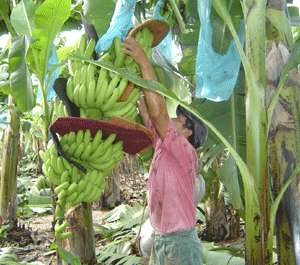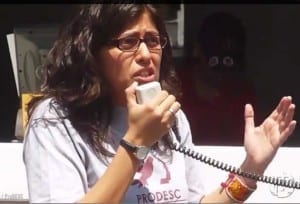Jan 17, 2014

A Guatemalan banana worker.
Earlier this month, on January 5, Guatemala’s first homicide of the new year took the life of 19-year-old Marlon Dagoberto Vásquez López, an active youth leader and member of the construction workers’ union, Sindicato Nacional de Trabajadores de la Construcción y Servicios de Guatemala (SINCS-G). His murder brought to 65 the toll of trade unionists assassinated in the country since 2007. Most of their murders have gone unsolved, making Guatemala the most deadly place to be a union member, after Colombia.
The Solidarity Center works with SINCS-G and other Central American unions.
Last Friday, 11 members of the banana worker union, Sindicato de Trabajadores de la Empresa Agropecuaria Omagua, S.A. Campo Verde I y II, held a meeting at their headquarters in Izabal, Guatemala. As they held their meeting, an unknown vehicle approached from the highway fronting the Honduran border and unleashed gunfire upon the plantation workers, shooting Juan DeDios Sagastume Rodas, secretary general for the union. Despite being immediately informed of the attack, the National Police never appeared at the crime scene and waited until the following day to interview the victim at the hospital.
Over the past three years, seven banana union leaders have been murdered in Guatemala. The country has recently committed to a Labor Enforcement Plan as it attempts to avoid arbitration for violating the labor chapter of the CAFTA-DR free-trade agreement. The U.S. government filed the labor complaint in April 2008 based on evidence provided by six Guatemalan unions and the AFL-CIO. The Guatemalan government also committed to the Workers’ Group of the International Labor Organization “to ensure the safety of workers, with effective measures to protect union members and leaders, and their property, from violence and threats.”
The astounding violence of the first weeks of 2014 against trade unionists in Guatemala must end. The American labor movement joins Guatemalan union federation UNISTRAGUA and the Trade Union Confederation of the Americas (TUCA-CSA) to demand President Otto Pérez Molina ensure prompt investigations of these attacks against union members, find the perpetrators and define a policy and actions to guarantee the life and physical integrity of union members and freedom of association
Jan 7, 2014
In a letter to Cambodia Prime Minister H.E. Hun Sen, the AFL-CIO condemned the Cambodian government’s recent and ongoing violence against garment workers. Calling for an immediate end to the violence and for the release of imprisoned union leaders, the AFL-CIO also is demanding “an independent investigation surrounding the killing and assaults of workers” as well as the withdrawal of legal cases against workers and release of imprisoned union leaders.
On January 2, Cambodian trade union leaders were assaulted and arrested and at least four garment workers killed, with many others injured by security forces at the Canadia Special Economic Zone. Workers have been seeking a higher minimum wage in the garment sector, the nation’s most lucrative industry.
Read the full letter.
Jan 7, 2014

Credit: Congress of Haitain Workers
Four years ago this weekend, a massive earthquake brought catastrophe to the lives and livelihoods of tens of thousands of Haitians. Despite an outpouring of promises and millions of dollars in investment designated to help workers get back on their feet, the majority of Haitians still live in poverty. Instead of supporting recovery, their meager incomes fund little more than continued privation.
Formal jobs, particularly those in the export sector, were presented as the panacea to Haiti’s economic woes and key to helping Haitian men and women move forward. Yet four years after the January 12 quake, the country has five minimum wages, divided by sector—none of them enough to cover basic expenses, said Molly McCoy, Americas regional program director for the Solidarity Center. “These should be good jobs, but workers are telling us that no one is getting by.”
The Collective of Textile Factory Unions Organization (KOSIT), an alliance of four Solidarity Center partner unions in the garment sector, is calling for a minimum wage that will enable workers to meet their basic needs.
Workers with export-related jobs such as garment assembly, a sector that largely employs women, say they often take home lower than the minimum wage because it is tied to complicated and unreachable quotas. And recent studies point to factories cheating workers out of earned wages, exacerbating the struggle to earn a decent living. Meanwhile, prices in the island nation, a net importer of food and fuel, continue to rise.
As the Solidarity Center reported in 2011 and continues to hear from workers in the capital, Port-au-Prince, workers cannot earn enough to feed and shelter their family, cover transportation to work and send their children to school.
“Haiti needs a single minimum wage that all workers are able to earn—one that people can actually live on,” said McCoy. “Exploitive jobs that mire working people in subsistence lives is the wrong combination for recovery, much less for building Haiti back better.”
Jan 3, 2014

Alejandra Ancheita, a Mexican human rights lawyer, is featured on Moral Courage TV.
Alejandra Ancheita, a Mexican human rights lawyer, bravely fights for social justice and human rights in her country–following in the footsteps of her activist father, who died under questionable circumstances on her eighth birthday.
She founded ProDESC, an organization that fights for economic, social and cultural rights and which is a Solidarity Center partner.
Ancheita regularly receives death and other threats for her support for vulnerable people in her country including as a direct result of her work to support workers and community members trying to win justice from a Canadian mine company in the state of Durango.
Her story is featured on Moral Courage TV.
Story in Spanish here.



